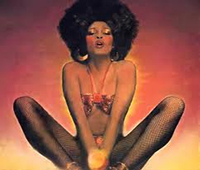To have its world premiere at the prestigious Amsterdam International Documentary festival – IDFA – in November 2017, Betty – They Say I’m Different is an intimate portrayal of Betty Mabry Davis, a cult figure in popular music whose incredibly rich life story will allow us to address issues of race, gender, fame, and the role of liberated women in American society. This is project by director Phil Cox who has written this creative documentary after four years of conversing and spending time with Betty Davis.
Betty, who grew up in Pittsburgh, changed the landscape for female artists in America. She “…was the first…” as Miles Davis said. From an early age, Betty freed herself from social rules traditionally imposed on women and insisted on complete control of her image, and recordings, and in the case of her turbulent marriage to Miles Davis, her personal life as well. At the height of her fame in the early 1980s, she mysteriously disappeared from public life. In late 2012, after much research, the filmmakers discovered Betty Davis living quietly alone in outer Pittsburgh, and she entrusted the filmmakers with telling her story. With exclusive life rights and access to Betty, who is collaborating closely at every step, the filmmakers have unraveled a powerful and tender life story that begins on a North Carolina farm, through the highs of the fashion and music world of New York and the West Coast in the 60s and 70s, and ends alongside the dormant steel mills of Pittsburgh where Betty has lived in solitude for the past 35 years.
Betty Davis is known for her outsized life, fashion and music in 1970s America — but her raunchy lyrics and explosive stage energy clashed with the race and gender stereotypes of her time, leading the NAACP and black middle class to object to her music and boycott her performances. This film will discover a very private Betty who fought to keep her integrity as a woman and songwriter, choosing to vanish from the music scene rather than compromise her creativity. Now living in the same steel town where she spent her childhood, Betty, for reasons that this film will reveal for the first time, chose to vanish from the limelight for three decades, cutting off from everyone from her past. As the film unveils Betty’s childhood, as well as the isolative years of her post-career life, Betty’s story will be rendered with a sensitivity that honors our subject and her quest for inner peace.
Our film will show that Betty Davis was a woman ahead of her time — and that she suffered for it, as she elucidates with hard-bitten, sardonic humor in the lyrics to “Stars Starve, You Know,” one of her last recordings. Along the way, viewers will see that she was the equal of Tina Turner or Chaka Khan in terms of style, stage charisma, and pure sex appeal, and that Betty laid the groundwork for later divas such as Macy Gray and Erykah Badu, white soul singers like Amy Winehouse and Nikka Costa, and rockers Karen O and Jennifer Herrema. Her influence on fashion alone, via her friendships with top designers Betsey Johnson, Halston, and Stephen Burrows, continues to resonate today as designers and artists in the U.S., U.K., France, and Japan — from American Apparel to the online fashion store Nasty Gal Inc — pay tribute to her style. The film further illuminates how, through her groundbreaking funk music and sexed-up lyrics and stage act, Betty broke and flouted taboos in the 1970s, resisting what was deemed “respectable” for women by the record industry and establishment culture. In the 21st century, as her music continues to be discovered and Betty is cited as a major influence by artists as diverse as Madonna and Prince, Lenny Kravitz and Peaches, the story of this “black panther woman” (Carlos Santana) will finally be told, and the mystery of her fall into oblivion made comprehensible, even to those closest to her, for the very first time.
Although we are honoring her legacy, this is a story that resides in the here and now. It is a story of today, as much as of the last fifty years. Betty’s battle as a female artist breaking stereotypes, resisting commercialization and trying to be true to herself is a conflict played out endlessly today. Now is the time, together with Betty in her own words, to bring her story, her music, and her struggle for personal and spiritual integrity forward to a new generation and into the light of public recognition.
Check out the dedicated Nasty Gal website here!
A NATIVE VOICE FILMS & LA COMPAGNIE DES TAXI BROUSSE film in Co-production with ARTE
Directed and filmed by PHIL COX
Produced by GIOVANNA STOPPONI DAMON SMITH LAURENT MINI
Exectuive Producers: KARIM SAMAI CATHERINE BAILEY
Editor ESTEBAN UYARRA
Associate Producers DANIELLE MAGGIO
Animations KASH

